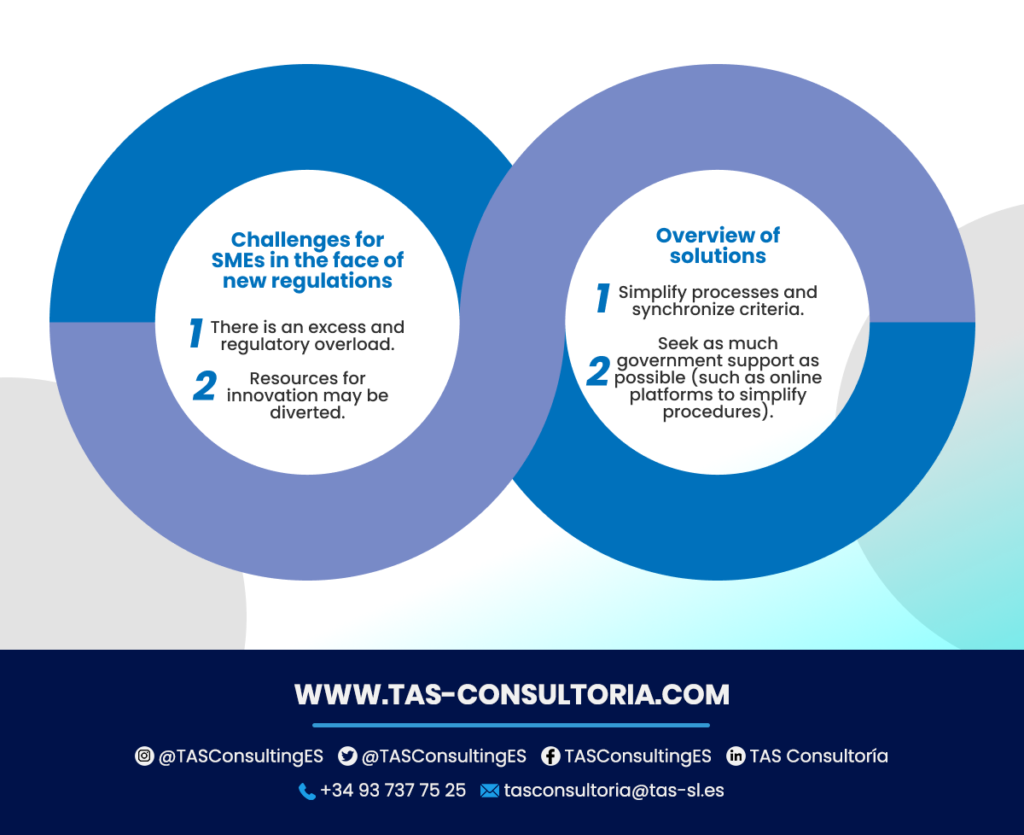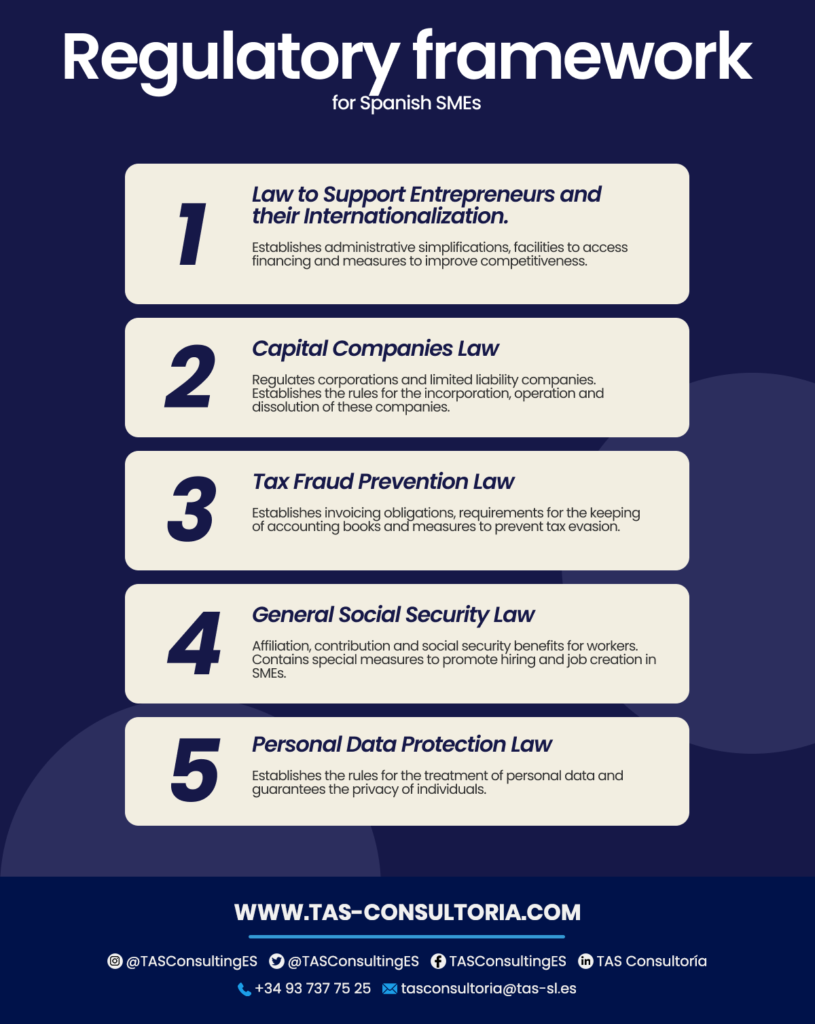
SMEs in Spain face a constant challenge: adapting to legal developments governing their digital transformation. Keeping up to date is essential for success, but often, excessive regulation hinders innovation and growth. We’ll explore the latest legal developments affecting the digitalization of SMEs in Spain – find out how your business can thrive in the digital age!
What are the new legislative changes for Spanish SMEs?
Small and medium-sized companies are economic pillars for Spain, so their regulation is constantly changing.
That is why the “Memento PYME 2023” is a resource or guide that provides relevant information on aspects:
- Legal
- Prosecutors
- Labor
- Accountants
Under this guide, we share with you the crucial aspects that you must take into account for this and next year. Don’t get left behind in the digitalization of SMEs and learn about the modifications:
Start-up and operation of the business activity
They address changes in the dissolution of capital companies and the elimination of the figure “New Company”. As well as updates in the Insolvency Law and novelties related to limited liability entrepreneurs.
Labor relations and Social Security
The “Memento PYME 2023” provides information on:
- The updating of contribution bases and rates.
- Determination of the Minimum Interprofessional Wage (SMI) for 2023.
- The new Employment Law
- The new contribution system for the self-employed
- Benefits for the sustainability of the activity (RED Mechanisms), among other relevant aspects for the digitalization of SMEs and their tax systems.
3. Relations with the Treasury
Other new developments include issues related to tax management. Especially the Personal Income Tax (IRPF), withholdings and other developments that impact the digitization of SMEs.
4. Relations with customers and suppliers
This section highlights modifications related to consumer protection. There are changes in the regime for the valuation of real estate as collateral for mortgage loans and transportation contracts.
5. Relationships with banks and insurance companies
The ICO 2023 Lines and amendments to the Pension Plans and Funds Regulation Law are included.
In addition to these key areas, the handbook covers aspects related to: real estate, environment and employer protection.
They provide a complete overview of the legal developments that will change the digitization processes of SMEs.
You may also be interested in: What is the Digital Kit Program?
What are the main challenges of the new regulations in the digitalization of SMEs?
One of the most outstanding challenges in the digitization process of SMEs lies in over-regulation.
Year after year, new formalities and regulations are added that directly impact the day-to-day activities of these organizations. This can generate a regulatory overload that diverts valuable time and resources to legal issues. Instead of enabling innovation and growth within the digitization of SMEs.
To overcome this challenge, you must have a synchronization of criteria and a simplification of administrative processes. Government agencies must gain a deeper understanding of the daily operations of SMEs and streamline procedures.
This, in turn, would allow these companies to free up resources that would otherwise be earmarked for regulatory compliance.
In this context, one of the recent initiatives of the Public Administration has been the creation of an online platform.
This measure represents an important step in the right direction of SME digitalization. It seeks to simplify and optimize the relationship between SMEs and the authorities. Contributing to alleviate the regulatory burden that often hinders the progress and development of these companies in the digital era.
You can see a summary of the key challenges:

You may also be interested in: Regulations for e-commerce in Spain
What is the regulatory framework for SME business growth?
In the Spanish context, SME policy should focus on eliminating barriers that hinder their growth and consolidation. Spain has a similar proportion of SMEs compared to the European Union. Although, the greater presence of micro-enterprises in our country stands out.
It is important to note that few companies experience organic growth that leads them to surpass the 10-employee barrier. This figure decreases even further in those companies that manage to exceed the thresholds of 50 or 250 employees.
The following are the regulations that govern the transformation and growth in the digitization of SMEs:

How to think strategically for the benefit of your business?
The SME support strategy should focus on the creation of regulations that remove obstacles and allow these companies to grow and consolidate.
The weight of administrative regulation and the bureaucratic burden have a direct impact on business growth. Especially in the process prior to obtaining licenses and permits.
The simplification of these procedures becomes an imperative need to facilitate the expansion of SME digitization.
It is worth mentioning that Spain ranked 120th out of 140 countries analyzed in terms of government regulatory burden. According to the Global Competitiveness Report 2017-2018 of the World Economic Forum.
The inefficiency of the administrative bureaucracy was identified as the most problematic factor for conducting business in our country. Added to this regulatory complexity is the corresponding administrative complexity.
That said, it is important to note that Spain has made significant efforts to reduce administrative burdens through various annual plans. The European Commission, for its part, has implemented numerous measures aimed at reducing bureaucracy and simplifying processes.
You may also be interested in: International telework regulation
Given this scenario, it is important to be surrounded by analytical and specialized minds. Those that help you to be a few steps ahead in the transformation and digitization of SMEs in Spain.
Keep your SME up to date with digital legislation. If you need personalized guidance for your business, do not hesitate to request a legal consultation tailored to your needs through tasconsultoria@tas-sl.es. We are here to help you on your way to SME digitization!




Your email address will not be published .
Required fields are marked with *